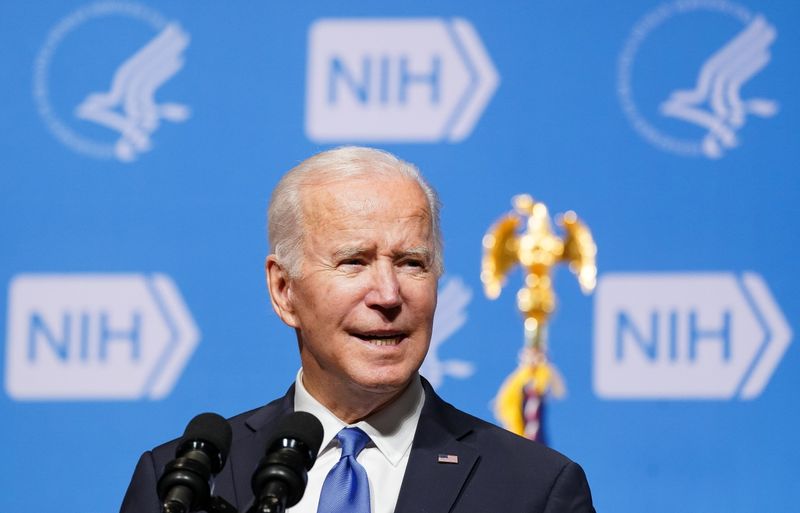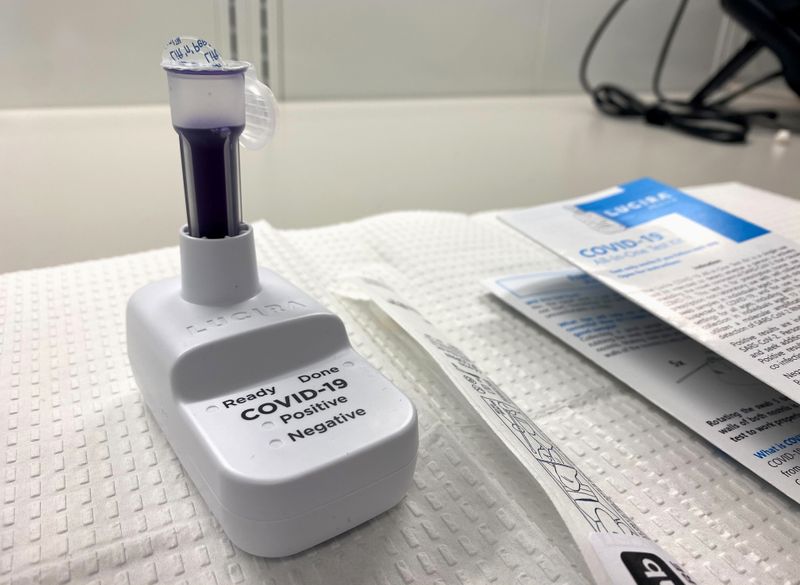By Jeff Mason
WASHINGTON (Reuters) - President Joe Biden on Thursday laid out his strategy to fight the Omicron and Delta coronavirus variants over the winter, including free and insurer-funded at-home COVID-19 testing and new requirements for international travelers.
The U.S. government will require private health insurers to reimburse their 150 million customers for the cost of over-the-counter, at-home COVID-19 tests, administration officials said, and make 50 million tests available free through rural clinics and health centers for the uninsured.
Reimbursement for tests will not kick in, however, until January, missing the crucial holiday period when many families and groups gather indoors.
"We're going to fight this variant with science and speed, not chaos and confusion," Biden said at the National Institutes of Health in Maryland, while warning that infections will rise this winter.
"The actions I'm announcing are ones that all Americans can rally behind and should unite us in the fight against COVID-19," he said.
The administration is urging all eligible Americans to get vaccinated or obtain booster shots to fight the virus and protect against Omicron, which is spreading quickly around the world. It plans to increase family vaccination sites and expand availability at pharmacies.
Less than 60% of the U.S. population, or 196 million people, have been fully vaccinated, one of the lowest rates among wealthy nations. The administration says an additional 100 million are eligible for boosters. The Centers for Disease Control and Prevention said all vaccinated adults should get a booster in light of waning protection over time and the emergence of Omicron.
The United States also plans to require inbound international passengers to be tested for COVID-19 within one day of departure, regardless of vaccination status. Mask requirements on airplanes, trains and public transportation vehicles will be extended to March 18.
The new plan will also improve care for those who get COVID-19, tripling the number of “surge response teams” that provide extra staff at hospitals that are overrun with patients to 60 from its current level, Biden said.
It will speed more medications "recommended by real doctors not conspiracy theorists," he added.
The efforts to expand testing and shots come as the world faces new threats from the Omicron variant, and the United States confronts a heavily entrenched, politically fueled anti-vaccination culture.
Fears about the variant have pounded financial markets and created doubts about the speed of the global economic recovery as the pandemic rages on.
The White House is considering further restrictions and ways to boost testing and vaccinations that will depend on the severity of the variant, White House Press Secretary Jen Psaki said.
INSURERS SEEK CLARITY
Psaki told reporters earlier on Thursday that the Biden administration would clarify whether private health insurance companies would get government money to reimburse customers for over-the-counter tests when it releases guidance on the issue by mid January.
A White House official said later on Thursday, however, that the government will not reimburse private health insurers for the cost of at-home tests. Insurers were required to cover diagnostic testing for COVID-19 "without any cost-sharing requirements during the public health emergency," the official said.
Additional free tests at healthcare clinics should be available as soon as this month, Psaki said.
Biden said free tests would be available for pickup at thousands of convenient locations for those without private insurance.
"The bottom line: This winter, you'll be able to test for free in the comfort of your home and have some peace of mind," he said.
The largest U.S. employer-based health insurers include Cigna Corp (NYSE:CI), UnitedHealth Group (NYSE:UNH) and CVS Health Corp (NYSE:CVS). Currently, insurers are reimbursed a set amount by the government for most medically necessary COVID-19 tests performed in labs and medical offices.
Kristine Grow, spokesperson for insurance industry lobby AHIP, said the industry is working with the administration to make sure the impact of any testing plan is fully understood. Areas of concern include price gouging on these tests, higher premiums and clear rules and guidance for implementation, she said.
Morningstar analyst Julie Utterback said she views the government’s plan as a shift in the potential site of testing, rather than a significant increase in costs for health insurers, assuming at-home tests can be accepted as valid.
"To control the spread of the virus from a policy perspective, I see the logic in trying to keep infected people at home instead of forcing them to interact with people outside their household when they are experiencing symptoms," Utterback said.

Evercore ISI analyst Michael Newshel said the strategy could come at a notable cost for health insurers, with the coverage requirement possibly lasting through the first half of the year.
More than 786,000 people have died from COVID-19 in the United States, including 37,000 in November alone.
